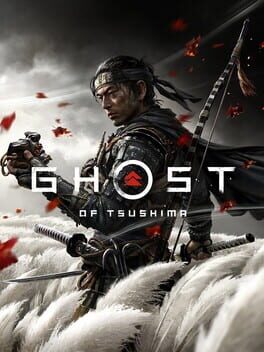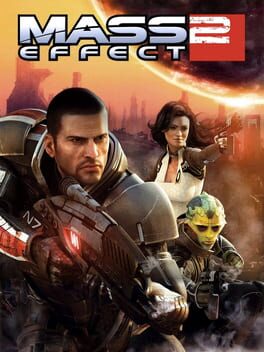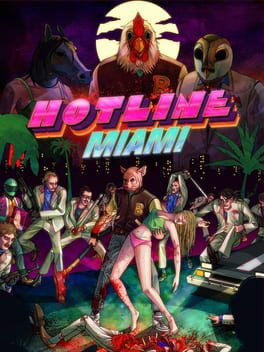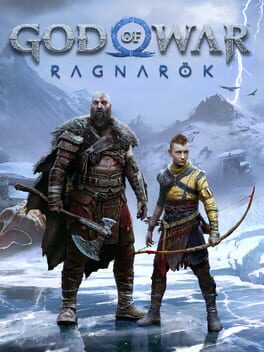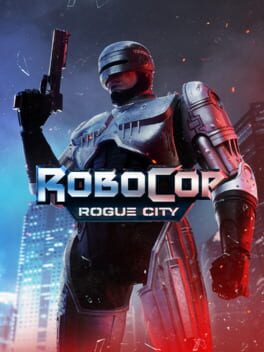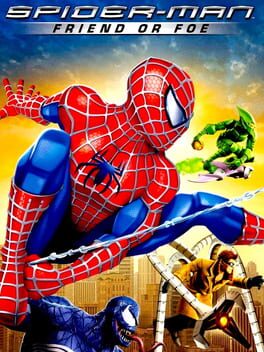Lunter87
Bio
as you can see, I usually prefer the story stuff, but I just love an adventure
as you can see, I usually prefer the story stuff, but I just love an adventure
Badges

GOTY '23
Participated in the 2023 Game of the Year Event

N00b
Played 100+ games

3 Years of Service
Being part of the Backloggd community for 3 years
Favorite Games
202
Total Games Played
000
Played in 2024
005
Games Backloggd
Recently Reviewed See More
This review contains spoilers
"For the sake of our children."
Who we were. Who we are. And who we strive to be.
This rating is admittedly a tad generous. I wouldn't even call this my favorite God of War entry in terms of either narrative or combat, and there are some sections here that I straight up do not like. Yet, I cannot get it off my mind. These recent couple of games are one of the most fascinating new directions I've ever seen a franchise take. When the 2018 entry released, many seemed to think (some still do) that the series had become embarrassed and/or ashamed of its roots, just like Kratos himself. Or in an opposing yet similar view, that the transition gave the games emotional depth that they never had to begin with. I really can't agree with either of those sentiments. The Greek and Norse eras of God of War compliment each other much more than many would like to admit.
2018's entry (times like this I really wish they just called it "God of War IV") showed much restraint when it came to fan-service and referencing events of prior games, only touching on them when it truly makes sense for Kratos to open up a little. That one had my personal favorite narrative of the franchise, primarily for its more intimate scale and being a shining example of "show, don't tell". The Lone Wolf and Cub trope is pretty hard to get wrong, but by god was it a wise move for a character like Kratos at that particular point in his life. Many stories like these have their protagonist with a dark, secretive past that they keep from their kin. But not only have we witnessed this man's entire history of bloodshed, we were a willing participant. Not trying to Last of Us II this shit, obviously these are silly video games. But the added layers of having lived this guy's eternally damned past with him elevates every narrative choice tenfold.
Ragnarök is bigger. And with that comes a challenge of having to juggle those same intimacies with an epic scale far more like that of the Greek era games, and for the most part it succeeds. I think some of the things I loved about this father and son dynamic get sidelined, but for reasons I did not expect. In this game, Kratos has like, actual friends, beyond his son. People that genuinely enjoy his company and vice versa. They're few and far between, but significant voices in his life. A support system that actually cares about both his physical and mental wellbeing. And I found these relationships to be just as riveting. Overall I ultimately prefer 2018's much more clean cut story, but most of Ragnarök's issues come with the massive swings it takes, which is always something I admire. Atreus's sections are mostly too long, and his gameplay is very dry compared to Kratos's, so every time one of these pops up, it's hard not to feel whiplash. The Jotunheim one is especially snail-paced. But separating Atreus from his father for nearly half the story is a bold move, and allows for these other friendships to be deeply explored in a way I was not anticipating. Everything with Freya especially feels incredibly earned, and that was a narrative thread I was pretty unsure about coming out of the previous game.
This focus on these relationships goes the extra mile further with the brilliant roguelike epilogue Valhalla, as Kratos navigates his memories from his initial deal with Ares to now. He can't run from any of this anymore, and when the world he now protects asks him to sit atop yet another throne of war, he's obviously distraught and hesitant. His only option now is to finally stop for a moment and attempt to process everything. In other words, therapy. It's here where we see what might be Ragnarök's greatest accomplishments. Tyr proposes that the solution to Kratos's shamed identity is not to bury it, but to redefine it. Some could see this as fan-service central, as it has by far the most references to prior entries, yet still only when the narrative and character arcs call for it. With the ever-supportive Mimir by his side and the contrasting mental construct of Helios rejecting his every word, a phenomenal balance of two eras is struck here. No world-ending stakes in sight, just a withered old man reconciling his whole life up to this moment. It concludes with what may be my favorite scene in this series to date. A quite literal confrontation with his younger, immature self. Judge's award winning performance here is jaw-dropping and while I would've enjoyed seeing him argue back and forth with Terence Carson, I think this might be better off as just a monologue and letting it all breathe.
The key line that sums up this entire string of games: "You have always been more than what others have saw." Kratos can never be absolved of everything he chose to do, but he can finally see that the good he seeks was always in him. Buried under a lot of blood and muck, but it was there. The realization that who he is and who he can be, is only possible because of who he was. And that's why these last two games are so fascinating to me. This story wouldn't really work to this astonishing extent if it wasn't for everything that came before. These new games are obviously a change, but their primary focus is shining a brighter light on aspects that were always there. This was kinda a whole lot of rambling and this doesn't even scratch the surface of what I love about these, but I hope it makes some sense. Kratos is really just one of those characters I could talk about for days, and I'll always love his journey from vengeance to contentment. Forgiveness cannot be found in Valhalla, only acceptance.
Who we were. Who we are. And who we strive to be.
This rating is admittedly a tad generous. I wouldn't even call this my favorite God of War entry in terms of either narrative or combat, and there are some sections here that I straight up do not like. Yet, I cannot get it off my mind. These recent couple of games are one of the most fascinating new directions I've ever seen a franchise take. When the 2018 entry released, many seemed to think (some still do) that the series had become embarrassed and/or ashamed of its roots, just like Kratos himself. Or in an opposing yet similar view, that the transition gave the games emotional depth that they never had to begin with. I really can't agree with either of those sentiments. The Greek and Norse eras of God of War compliment each other much more than many would like to admit.
2018's entry (times like this I really wish they just called it "God of War IV") showed much restraint when it came to fan-service and referencing events of prior games, only touching on them when it truly makes sense for Kratos to open up a little. That one had my personal favorite narrative of the franchise, primarily for its more intimate scale and being a shining example of "show, don't tell". The Lone Wolf and Cub trope is pretty hard to get wrong, but by god was it a wise move for a character like Kratos at that particular point in his life. Many stories like these have their protagonist with a dark, secretive past that they keep from their kin. But not only have we witnessed this man's entire history of bloodshed, we were a willing participant. Not trying to Last of Us II this shit, obviously these are silly video games. But the added layers of having lived this guy's eternally damned past with him elevates every narrative choice tenfold.
Ragnarök is bigger. And with that comes a challenge of having to juggle those same intimacies with an epic scale far more like that of the Greek era games, and for the most part it succeeds. I think some of the things I loved about this father and son dynamic get sidelined, but for reasons I did not expect. In this game, Kratos has like, actual friends, beyond his son. People that genuinely enjoy his company and vice versa. They're few and far between, but significant voices in his life. A support system that actually cares about both his physical and mental wellbeing. And I found these relationships to be just as riveting. Overall I ultimately prefer 2018's much more clean cut story, but most of Ragnarök's issues come with the massive swings it takes, which is always something I admire. Atreus's sections are mostly too long, and his gameplay is very dry compared to Kratos's, so every time one of these pops up, it's hard not to feel whiplash. The Jotunheim one is especially snail-paced. But separating Atreus from his father for nearly half the story is a bold move, and allows for these other friendships to be deeply explored in a way I was not anticipating. Everything with Freya especially feels incredibly earned, and that was a narrative thread I was pretty unsure about coming out of the previous game.
This focus on these relationships goes the extra mile further with the brilliant roguelike epilogue Valhalla, as Kratos navigates his memories from his initial deal with Ares to now. He can't run from any of this anymore, and when the world he now protects asks him to sit atop yet another throne of war, he's obviously distraught and hesitant. His only option now is to finally stop for a moment and attempt to process everything. In other words, therapy. It's here where we see what might be Ragnarök's greatest accomplishments. Tyr proposes that the solution to Kratos's shamed identity is not to bury it, but to redefine it. Some could see this as fan-service central, as it has by far the most references to prior entries, yet still only when the narrative and character arcs call for it. With the ever-supportive Mimir by his side and the contrasting mental construct of Helios rejecting his every word, a phenomenal balance of two eras is struck here. No world-ending stakes in sight, just a withered old man reconciling his whole life up to this moment. It concludes with what may be my favorite scene in this series to date. A quite literal confrontation with his younger, immature self. Judge's award winning performance here is jaw-dropping and while I would've enjoyed seeing him argue back and forth with Terence Carson, I think this might be better off as just a monologue and letting it all breathe.
The key line that sums up this entire string of games: "You have always been more than what others have saw." Kratos can never be absolved of everything he chose to do, but he can finally see that the good he seeks was always in him. Buried under a lot of blood and muck, but it was there. The realization that who he is and who he can be, is only possible because of who he was. And that's why these last two games are so fascinating to me. This story wouldn't really work to this astonishing extent if it wasn't for everything that came before. These new games are obviously a change, but their primary focus is shining a brighter light on aspects that were always there. This was kinda a whole lot of rambling and this doesn't even scratch the surface of what I love about these, but I hope it makes some sense. Kratos is really just one of those characters I could talk about for days, and I'll always love his journey from vengeance to contentment. Forgiveness cannot be found in Valhalla, only acceptance.
Just fantastic. Great to see that games like this still exist and still deliver. Paul Verhoeven's Robocop is a huge favorite of mine and a titan of splattery 1980's cinema that, more often than not, gets vastly misinterpreted. One could argue it would've been better off as a one-off single film with no franchise. Irvin Kershner's 1990 sequel is fine, while the third entry and the 2014 remake are dreadful watches.
But then we have this game here, Rogue City, which is probably the best follow-up that Verhoeven's original has ever gotten? First off, it is so so SO fucking fun to play. They really make use of his stiff movement and near-unbreakable armor as both strengths and weaknesses. There are seriously so many film-quality shootouts here. A stunning aesthetic for Old Detroit as well.
Often the inclusion of dialogue options and player decisions is for no real reason, but I think it makes a lot of sense here. One of the reasons this is such a great follow-up to the original film is that it's the only one where I buy that this guy has gone through those events. Murphy/Robocop has a brilliant arc in that film, and 1990's sequel largely ignores it. This is really that post-movie Murphy that I've always wanted to see, and you can take that even further depending on your choices. Peter Weller is absolutely fucking phenomenal. Getting him to reprise his role completely paid off and then some. He honestly may be better than ever, but it's tough to compare a voice performance to a live-action one. I'm sure he was happy to not be sweating under hours of makeup this time though.
The narrative is good enough. There's some neat subversions but overall it's nothing groundbreaking. I think those last few climactic sequences could've had a little more punch. There was clearly a big focus on getting the humor right, and I really enjoyed that aspect. Biggest issue is that despite retaining that anticapitalist humor of the film, this is honestly kinda bordering on copaganda. Some exceptions can be made when it's this very fictional retrofuturist dystopia, but I think way too many cops were depicted as heroic white knights here.
Terrific game overall. Pleasantly surprising as a first person shooter and hugely satisfying as a love letter to the film.
But then we have this game here, Rogue City, which is probably the best follow-up that Verhoeven's original has ever gotten? First off, it is so so SO fucking fun to play. They really make use of his stiff movement and near-unbreakable armor as both strengths and weaknesses. There are seriously so many film-quality shootouts here. A stunning aesthetic for Old Detroit as well.
Often the inclusion of dialogue options and player decisions is for no real reason, but I think it makes a lot of sense here. One of the reasons this is such a great follow-up to the original film is that it's the only one where I buy that this guy has gone through those events. Murphy/Robocop has a brilliant arc in that film, and 1990's sequel largely ignores it. This is really that post-movie Murphy that I've always wanted to see, and you can take that even further depending on your choices. Peter Weller is absolutely fucking phenomenal. Getting him to reprise his role completely paid off and then some. He honestly may be better than ever, but it's tough to compare a voice performance to a live-action one. I'm sure he was happy to not be sweating under hours of makeup this time though.
The narrative is good enough. There's some neat subversions but overall it's nothing groundbreaking. I think those last few climactic sequences could've had a little more punch. There was clearly a big focus on getting the humor right, and I really enjoyed that aspect. Biggest issue is that despite retaining that anticapitalist humor of the film, this is honestly kinda bordering on copaganda. Some exceptions can be made when it's this very fictional retrofuturist dystopia, but I think way too many cops were depicted as heroic white knights here.
Terrific game overall. Pleasantly surprising as a first person shooter and hugely satisfying as a love letter to the film.
Huge amount of nostalgia for this one, I swear I've seen that opening cutscene at least thirty times lmao. Was my introduction to so many of my favorite characters, such as Mysterio, Iron Fist and Blade.
It's a really cool little beat 'em up. Shines brightest in soundtrack, environments and character variety. The story is as basic as it gets, and the enemy types can be pretty repetitive, but it's a fun time. James Arnold Taylor is a terrific Spidey.
It's a really cool little beat 'em up. Shines brightest in soundtrack, environments and character variety. The story is as basic as it gets, and the enemy types can be pretty repetitive, but it's a fun time. James Arnold Taylor is a terrific Spidey.

